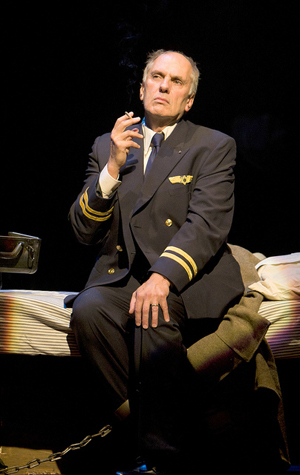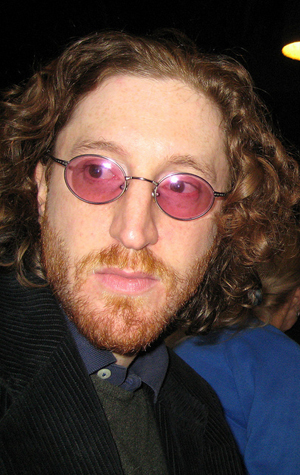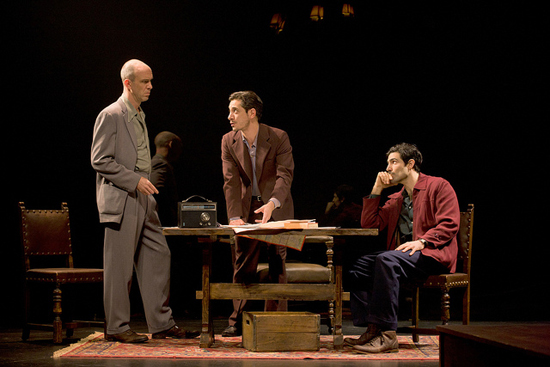Captors a Gripping Morality Tale
Huntington premiere: new perspective on Nazi war criminal

The late Peter Malkin, one of the Israeli covert agents who in 1960 snatched Nazi war criminal Adolf Eichmann from a Buenos Aires suburb to face trial in the young state of Israel, wrote that in the 10 days he and his team spent with Eichmann, “the problem…was with a human being, not with a monster…The human being does things that even the monster does not do, because the human is more sophisticated.”
The tense limbo of those 10 days is the subject of Evan M. Wiener’s new play Captors, a Huntington Theatre Company production opening Sunday, November 20 at the Boston University Theatre. It’s a weighty, morally fraught story, and Wiener, who conferred with Malkin before the former Mossad agent’s death in 2005, plunges into it with Shakespearean zeal. “This is not a History Channel docudrama,” says the award-winning scriptwriter, who seeks to separate audiences from what he calls the “Eichmann brand,” embodied by Eichmann in Jerusalem author Hannah Arendt’s famous catchphrase about the notorious Nazi: the “banality of evil.”
Part of the Huntington’s 30th anniversary season, Captors tells “an incredibly important story,” says Huntington artistic director Peter DuBois.
At the time of Eichmann’s capture, more than a half-century before U.S. forces’ lethal ambush of Osama bin Laden on foreign soil, the brazen rogue operation was condemned by governments around the world and deplored in the pages of the New York Times. When Mossad caught up with him, the unapologetic architect of Hitler’s Final Solution in Eastern Europe, who was ultimately hanged by Israel in 1962, was living quietly under a pseudonym and working at a Mercedes Benz plant. Beset by mishaps, the hunt for Eichmann ended when the Israeli agents wrestled the elusive Nazi to the ground and into a waiting vehicle. According to his 1990 memoir, Eichmann in My Hands, Malkin wore gloves so he would not have to touch the man responsible for the deaths of his sister and other relatives. Wiener’s play is set in the Buenos Aires safe house where Eichmann’s captors, most of whom had lost family in the Nazi slaughter, were charged with getting him to agree to face trial in Jerusalem.

Directed by DuBois and featuring award-winning actor and playwright Michael Cristofer in the role of Eichmann, Captors is rumored to be heading to New York for a Broadway run later this year. Although the play humanizes the notorious “man in the glass booth,” so-called because he was seated in a bulletproof enclosure during his trial, it does not in any way let him off the hook, says Wiener. “As I explored the material, I found that he doesn’t fit into the neat little box that Hannah Arendt wrote about,” he says. He believes that although Eichmann is the embodiment of the idea that “an ordinary person can do horrific things,” there are unique aspects to his character that should not be ignored. “Not everyone can rise to lieutenant colonel in the Waffen SS,” he notes.
The restless, wary Mossad agents “had to share a house with Eichmann and they had to keep him in perfect condition for the trial,” not knowing how secure their location was from Nazi sympathizers and anti-Nazi vigilantes, says Wiener, who invited a Mossad agent to speak to the cast early in the rehearsal phase. In the claustrophobic world of Captors, its set designed by Beowulf Boritt (a Tony nominee for last year’s Broadway musical The Scottsboro Boys), the character of Malkin, played by Louis Cancelmi, develops a relationship with Eichmann, and the plot follows their back-and-forth, “the head games and the danger of trying to engage this person,” Wiener says. The play explores the notion that “the captive will always disappoint his captor. They expect a monster and wind up with an ordinary person, but that doesn’t excuse him.” Reflecting on images such as the defeated, disheveled Saddam Hussein in his underwear, Wiener cautions, “We have to be careful of letting our emotional connection to people get in the way.” Indeed, as his captors apply rejuvenating makeup to the aging Eichmann in the play to confirm his identity, the fugitive Nazi gradually reveals his manipulative, ruthless core. “He’s not a mustache-twirling villain,” says the playwright. “He’s an adept figure.”
There are surprising moments of levity in the play, which portrays the ragtag team of Mossad agents as “earthy, regular guys who understand gallows humor,” says Wiener.

Playing the part of Mossad agent Uzi, Ariel Shafir (CFA’98) calls Captors a memory play, with a Rashomon quality. Malkin, after all, maintained his silence for 30 years after Eichmann’s capture. The play tests Malkin’s version of what those 10 days were like, says Jerusalem-born Shafir, whose family immigrated to the United States when he was three. “My main thing is never to have set preconceptions,” he says. “The challenge was to find the balance and the nuance in things. We know what the spy and Holocaust genres are, and we know who Eichmann was. How do we get past those two-dimensional cutouts” and into the minds of the exhausted agents who had to spend 10 days with a mass murderer?
“These aren’t Daniel Craig in Munich,” Shafir says, referring to the British actor who portrayed a crafty South African character who was part of the team avenging the 1972 massacre of Israeli athletes at the Munich Olympics in the 2005 Steven Spielberg (Hon.’09) film. “These are guys who don’t necessarily know what they’re doing” and are also dealing with the trauma of having suffered personal losses in the Holocaust.
In addition to Shafir and Cristofer, who won both a Tony Award and a Pulitzer Prize for his 1977 drama The Shadow Box, the Captors cast includes Christopher Burns as Hans and Daniel Eric Gold as Cohn.
Wiener responds with a hint of defiance to the question of whether he was at all squeamish writing about events in the life of such a high-profile and much-analyzed historical figure: “The Titanic was one boat ride, and they got three film biggies out of that.”
Captors runs at the BU Theatre, 264 Huntington Ave., through Sunday, December 11, 2011. Tickets range from $25 to $89.50 and may be purchased online, by phone at 617-266-0800, or in person at the BU Theatre box office. Students can purchase tickets for $15 online or at the box office, but must show a valid BU ID when they pick up tickets. Patrons 35 and younger may purchase $25 tickets (ID required) for any production, and there is a $5 discount for seniors and military personnel. Members of the BU community get $10 off tickets (ID required) and are eligible for a special subscription rate. Half price tickets are available for BU faculty and staff, with a valid BU ID, during BU Community Night at Captors, Thursday, December 1, at 7:30 p.m.; order in advance online by using code BU50. Call 617-266-0800 for more information. Take the MBTA Green Line to Symphony or Orange Line to Mass Ave. Follow the Huntington Theatre Company on Twitter at @Huntington.
Comments & Discussion
Boston University moderates comments to facilitate an informed, substantive, civil conversation. Abusive, profane, self-promotional, misleading, incoherent or off-topic comments will be rejected. Moderators are staffed during regular business hours (EST) and can only accept comments written in English. Statistics or facts must include a citation or a link to the citation.